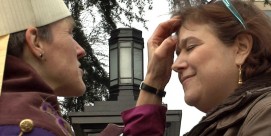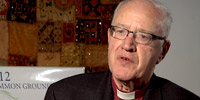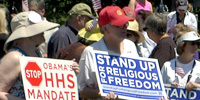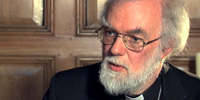In This Episode << SLIDE LEFT TO SEE ADDITIONAL SEGMENTS
Bishop Gene Robinson
Read more of Kim Lawton’s interview at the Lambeth Conference with Episcopal Bishop Gene Robinson of New Hampshire:
Q: What has your Lambeth experience been like?
A: It’s been a little bit surreal, both disappointing and uplifting, so it’s been a little bit of a roller coaster for me. Actually, being excluded from the conference has been harder than I expected. I thought I was going to be emotionally and spiritually prepared for it, but it’s been harder than I thought to be separated, especially from my own House of Bishops, and the schedule is so jam-packed that the bishops who are invited to the conference have so much to do and so little free time that it has made it very difficult for me to be in touch with many of them, and I can’t go near the venues where they are, so that’s been hard. The level of anxiety here is enormously high, and suspicion of me is very high, and I’ve done everything I can do to play by the rules. On Sunday for the opening service I told the Archbishop of Canterbury’s staff three times that I would not make any attempt to attend the service or be a distraction in any way, yet I understand that there were large photographs of me at every security checkpoint, and I’m sure that if I showed up I was not allowed in, and it’s just that kind of suspicion that’s very difficult. On a positive note, out here in the marketplace and around the edges of the conference, there’s just so much ministering to be done, and people want to talk, especially young people. There are hundreds of people here from all over the Anglican Communion who are serving as stewards, and I swear it’s almost impossible to pass any of them without them wanting to stop and offer their words of encouragement and support to me and see how I’m doing, and I’m loving those conversations, and also I am getting to talk to some people through conversations that are privately arranged, and they’ve been confidential, so nobody sees them meeting with me, because there would be a pretty big price to pay amongst their peers if they were seen to be meeting with me. There have been bishops who really have taken a risk to talk to me, and that’s been really rewarding.
Q: Have you had an opportunity, behind the spotlight, to talk to some people and make some plans?
A: Yes, I have. I can’t really tell you very much because it’s hard to talk about any of those situations without giving away enough of the details that if anybody wanted to figure out any of the details they could. What I take from those is this feeling that “we may not understand your context, and we may not agree on the issue of homosexuality, but we want to hold this Communion together, we don’t want to be separated from the American church, we really, we just want and need time,” and reflecting my own sentiments, “let’s just hold onto each other while we try to figure this out.” And yet forces seem to be afoot that want to force something, that seem to want a split, whether that split be by someone leaving or by someone being thrown out. I’m not a part of the meetings and that’s all discussed, but what we’re seeing coming out of those meeting are some proposals for a way of creating a more centralized authority within the Episcopal, within the Anglican Communion, and although sometimes that’s talked about in terms of facilitating reconciliation, if you read over those documents it just sounds like a way of punishing anyone who colors outside the lines, and that sounds like the Episcopal Church, the Canadian Church, and those of us who are working for the fuller inclusion of gay and lesbian people in the life of, the leadership of the church.
Q: How do you characterize where this process is moving? Is it moving at all or is it a stalemate?
A: I think it depends on what your expectations are. There are people who want this all tied up into a neat and tidy little package as of yesterday, and there are other people who feel that the longer we take doing this the better off we’ll be, because there will just be that much more time for people to converse with one another, understand where each other is coming from, and so on, so it probably depends on who you ask. I personally don’t think this Communion is broken, and if it ain’t broke don’t fix it, and there are all kinds of people trying to fix this. So as a person in the American church, I think we’re doing what is best in the Anglican tradition. We have always been a church that said you figure out what is appropriate for your local context, and you figure out what God is telling you to do there and do it. So the American church did that with my election and consenting with my election, and now people are suddenly saying, oh no, we didn’t really mean that at all, and we have to, we have to bring about more order. Well, you know, this is a church that was founded resisting such a centralized bureaucracy in Rome, so how odd for people who call themselves traditionalists to be trying to take us to a place that has never been our tradition, to be some kind of centralized authority that rules on whether or not something is too far out of step or whatever. So to those of us who don’t think it’s broken, it’s taken a long time [and] that’s just fine. But my fear is that there are people who are working to bring this to a close, a point of departure, I don’t know how you describe it, but someplace that will make everybody choose.
Q: What’s at risk with this meeting?
A: The reason I’m so committed to the Anglican Communion is, especially as an American and an American Christian, there are things I need to hear from people in the developing world, like the ramifications of our racism, our colonialism, American hegemony in terms of our military prowess, of economic clout, and so on, and I think we have done some pretty terrible things in the world, and if we don’t have brothers and sisters in Christ in the developing world who can tell us what will not be comfortable to hear, but speak the truth in love, as we’re commanded to do, I don’t know who’s going to tell us those things, and so I think we need each other, and the Communion, as it has been, is this quite loose confederation of churches, each doing ministry in its own context but, through a variety of ways, talking to each other. If we lose that we’ve lost a great opportunity, so I would really lament that. I don’t think it is worth completely giving up who we are, either as the American church or giving up our 500 years of tradition as an Anglican Communion, and changing ourselves radically to preserve it.
Q: Even though you weren’t invited to this meeting and even though some of this debate has been fairly intense, gay and lesbian people have had a presence here. Do you think this has been an opportunity for some awareness, in that there’s a bigger voice and presence?
A: You know, it’s always difficult to know how you’re affecting someone else, but one of the things that I’ve learned is that you have to try to make a faithful witness, and what gets heard or not heard, what God does with it, that’s not your concern. The question is, are you making a faithful witness? And the fact of the matter is there have been a whole lot of lesbian, gay, bisexual, and transgender people here from literally all around the world, and we’re all here for one purpose, which is to remind the bishops who are meeting that in every one of their congregations, whether they know it or not, there are gay and lesbian people, and we are here to remind them that we’re not going to go away, we’ve always been here, we will always be here, and, you know, they took a vow as a bishop to serve all of their flock, not just some of them, so I think we’ve done that. I think our presence here, regardless of what words we’ve spoken or what events we’ve had, just our presence here has been that kind of constant reminder.
Q: The next General Convention of the Episcopal Church is in 2009. What do you expect to happen there?
A: We often hear that the next meeting, the next gathering of whatever group, is going to be the donnybrook, we’re going to choose here who we will serve. Before the GAFCON [Global Anglican Future] conference in Jerusalem we heard this is it, the road is going to divide right here, and then it never turns out to be that kind of decision or point, and immediately it’s the next gathering that’s going to decide. Although I must say that for this next General Convention of the Episcopal Church in 2009 I think it might be that kind of a dramatic moment in this way: I think the American church has done its very, very best to be a part of this listening process, although I must say that I don’t see much of a listening process going on in most of the Communion. Some places, yes, but not in a lot of places, and I think we have tried patiently to articulate why we have done what we have done, but I think that in 2009 in our General Convention the Episcopal Church will stand up and declare itself and say, you know what, this is where we really do feel God is calling us to be, and we will never leave the Anglican Communion, and we’ll do everything we can to stay in it, but we have to be who we are, and then you the Communion are going to have to decide what you’re going to do with us. But we have to be who we are, and I think we’re going to see a quite explicit lifting of any understood moratorium on same-sex blessings and on the election of gay partnered bishops. So, in that sense, this is the first time I’m saying that I think this will be a really important moment.






